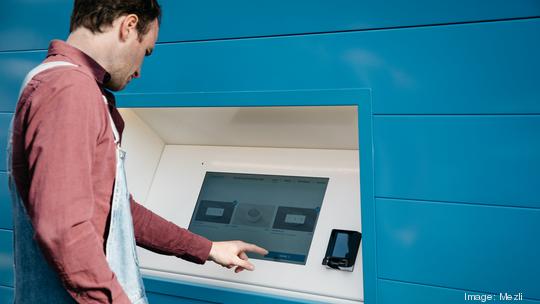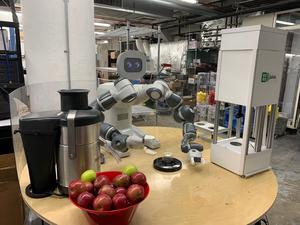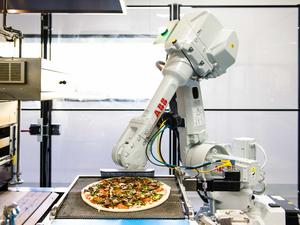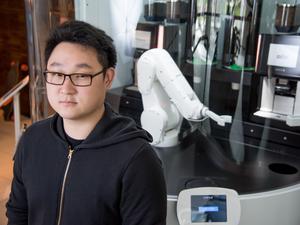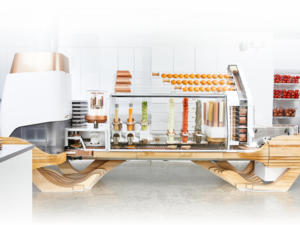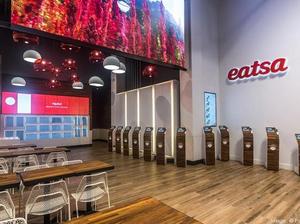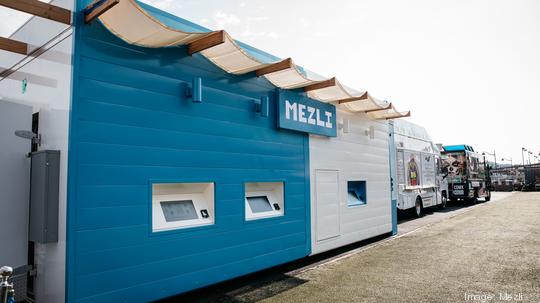
A San Mateo startup is launching what it calls the "world's first fully-autonomous restaurant" in San Francisco at Mission Bay's Spark Social, a food space for local food trucks.
Except: On closer inspection, it's not fully autonomous, nor even a full restaurant. And it's certainly not the world's first automated food service concept.
Mezli was founded in 2020 by CEO Alex Kolchinski, CTO Alex Gruebele and Maxwell Perham. They went through Y Combinator's winter 2021 program and have raised $3.5 million seed funding from investors, including UC Berkeley professor Pieter Abbeel (who is also an investing partner at AIX Ventures), Zaid Ayoub (the CEO of the Mediterranean fast casual chain SAJJ), Knockout Capital, Metaplanet Holdings, Reinforced Ventures and Share Capital.
Kolchinski, Gruebele and Perham are Stanford educated engineers who, during their time as graduate students, "found that they had no nearby food options that were convenient, affordable, and healthy," according to a press release.
So they got to work ideating and building what has become Mezli, a Mediterranean-themed refrigerated kiosk that uses automation to heat, finish and assemble meals without on-site human intervention.
But the ingredients are prepped off site by humans, and somebody also has to clean the machines.
On Monday, I spoke with Kolchinski and asked if the startup was overstating things. He allowed that "kiosk" is a fair interpretation of the setup, but they still consider it a restaurant that's serving full meals.
Some of the equipment within the kiosk is self-cleaning, he told me, but most of the food surface areas are self contained and maintained daily by their small team of humans. The technology is patented but they're not revealing any details publicly yet.
Whether this makes it the first fully automated restaurant is a matter of interpretation. It may hinge on the distinction between front-of-house and back-of-house service, and how much of it occurs on site.
"When you order a bowl from Mezli and then pick it up, no human has to lift a finger in the process at all to make that happen," Kolchinski told me.
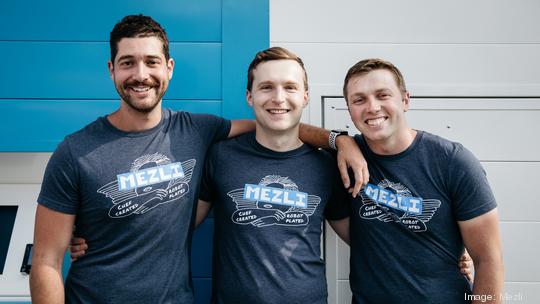
When Mezli opens for service at Spark Social on Aug. 28, there will be no waitstaff, no hosts and no bussers (generally considered the front of house service team) and no line cooks prepping ingredients and plating meals in the back.
There are many restaurants around the world that have varying degrees of automation and robotic service integrated into the dining experience, though.
In the Bay Area, Creator has developed a robotic hamburger station that cooks and assembles meals automatically. CafeX's robots serve up a variety of caffeinated drinks. Eatsa, though no longer operational, automated the ordering experience but kept human line cooks staffed in the back. And in 2017, Softbank led a $375 million investment into the robotic pizza maker Zume, though it effectively shut down in 2020.
Japan is known for being light years ahead of the U.S. when it comes to robotic food service, and this noodle restaurant highlighted by Japan Go! has developed a fully automated kitchen.
And this restaurant in Guangdong, China, has an automated kitchen, conveyor belts and robot waiters that can deliver food to tables, according to the South China Morning Post.
In South Korea, AP News has reported on a chain called No Brand Burger that automates most of the cooking and serving with human staffers adding toppings and wrapping up the burgers before sending out orders via robots.
Although there are varying degrees of automation in all of these concepts, invisible human labor remains a constant somewhere in the process. Ingredients need to be prepped, dishes need to be washed and equipment needs to be serviced. And sometimes, people just want to ask another human for help.
The restaurant business is also generally very tough, and while adding layers of technology can theoretically lower labor costs, developing and manufacturing robotics is an expensive, capital intensive operation.
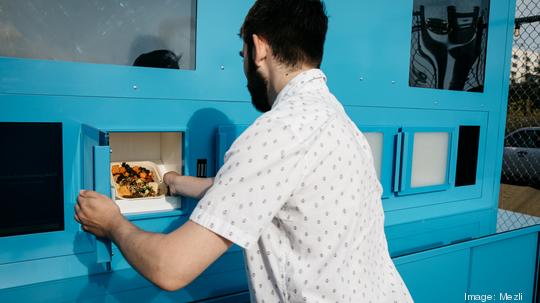
Mezli's co-founders will be focused on proving out their concept this year, but Kolchinski hopes to launch a couple more locations sometime next year, he told me. The company will be focused on the Bay Area for now, but eventually Kolchinski wants to expand nationally.
Each kiosk will be able to serve up to 500 meals a day at prices that start as low as $5 and can range up to $11.99 or more.
"The mission is really to reduce the price point of great meals and make them available for everyone, and that comes out of our own experiences in grad school," Kolchinski said. "Right now we're only about 10% cheaper than Chipotle but we can be substantially cheaper than that as we add more locations."
The kiosk was manufactured in San Mateo with materials from lots of vendors, and pandemic supply chain bottlenecks created challenges and delays, Kolchinski said.
Eventually, they will need bigger manufacturing facilities and kitchen space, but for now the team is running a lean operation in the Bay Area.
